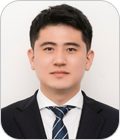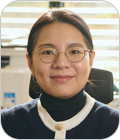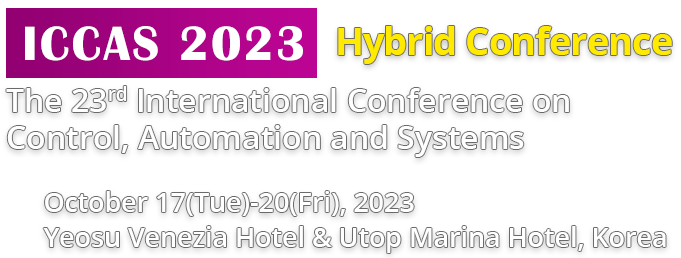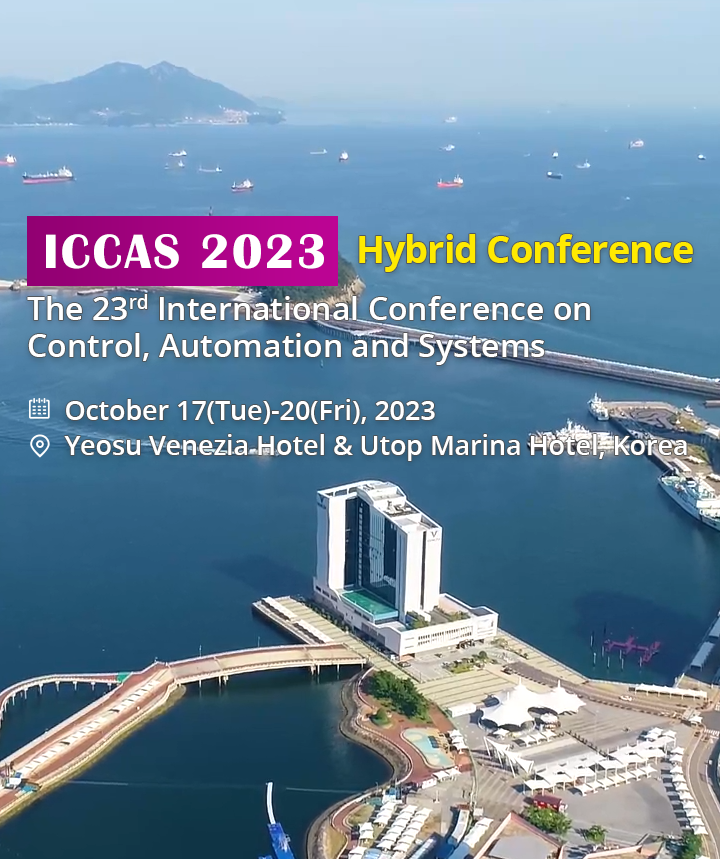Frontiers Session
 [WC1] Frontiers Session 1
[WC1] Frontiers Session 1Time: Oct. 18 (Wed) 16:00-17:30
Place: Room 1 Convention Center
 |
Autonomous 3D Scanning with Micro-Aerial Vehicles Prof. SooHwan Song Dongguk University, Korea Time: 16:00-16:30 Abstract & Biography
Abstract The demand for high-quality 3D models is continuously increasing in many industrial applications, such as geospatial applications, structural inspection, and digital twin applications. Many 3D modeling methods have recently utilized a micro-aerial vehicle (MAV) equipped with cameras. They perform 3D scanning by manually controlling the MAV or autonomously navigating it through simple coverage paths. In this talk, I will introduce a new scanning method based on online 3D modeling and inspection path planning. This method incrementally reconstructs a target model in real-time by using an online multi-view stereo (MVS). The method continuously analyzes the quality of the model and detects inaccurately reconstructed surfaces. It then plans an inspection path that provides complete coverage of the detected surfaces while maximizing the performance of MVS. Therefore, this method can construct a complete and accurate 3D model in minimal time without requiring specialized operators. Biography Education: 2015.03 – 2020.02 Ph.D. in Computer Science, KAIST 2013.03 – 2015.02 M.S. in Computer Science, KAIST 2006.03 – 2013.02 B.S. in Information & Communication Engineering, Dongguk University Experience: 2023.09 – Current Assistant Professor, Division of AISW Convergence, Dongguk University 2021.03 – 2023.08 Senior Researcher, Mobility Robot Research Division, ETRI 2020.03 – 2021.02 Postdoctoral Associate, School of Computing, KAIST |
 |
Generalized Model Predictive Torque Control of Synchronous Machines Prof. Kyunghwan Choi GIST, Korea Time: 16:30-17:00 Abstract & Biography
Abstract Despite the wide use of synchronous machines (SMs) in industry, optimal torque control of SMs is still challenging due to difficulties such as model nonlinearities, model uncertainties, and hard constraints in the control inputs. Most existing control schemes for this consist of multiple sub-controllers and rely on experimentally extracted data to handle the difficulties; thus, they require much effort to implement and lack practicality. To find the optimal but easy-to-implement control scheme, we have developed a generalized optimal torque control for SMs based on model predictive control (MPC). The generalized model predictive torque controller (GMPTC) handles the model nonlinearities and input constraints in one optimization framework, thereby involving fewer tuning parameters and model parameters than existing control schemes. Furthermore, with its simple implementation, the GMPTC guarantees optimal operation under all operating regions. In this talk, I will introduce the GMPTC for SMs, including its problem formulation, a solver for the problem, and validation results, along with its possible application for the universal SM controller. Biography Kyunghwan Choi received B.S., M.S., and Ph.D. degrees in mechanical engineering from Korea Advanced Institute of Science and Technology (KAIST), Daejeon, South Korea, in 2014, 2016, and 2020, respectively. He then worked at the Center for Eco-Friendly & Smart Vehicles at KAIST as a postdoctoral fellow and a Research Assistant Professor. He is currently an Assistant Professor in the School of Mechanical Engineering at Gwangju Institute of Science and Technology (GIST), where he is the director of the Mobility Intelligence and Control Laboratory. His research focuses on optimal control of electric drives and electrified vehicles. |
 |
Intelligent robotics from medical to agricultural applications Prof. Ayoung Hong Chonnam National University, Korea Time: 17:00-17:30 Abstract & Biography
Abstract A humanoid robot that resembles the shape of our body or an industrial articulated arm that works in the factory with no break first comes across our mind when we imagine a ‘Robot’. However, these are only a few examples of robotic systems. Small medical robots can move inside our body and deliver drugs or cells to the target lesion for treating some diseases. Agriculture robots can make farming more efficient and sustainable. Regardless of their size, shape, and application domain, intelligent robots share some features; they gather sensor measurements, map the information into internal representations of the environment, and make decisions on their action by planning with their own intelligence. In this talk, I will talk about the basic components of intelligent robotics and introduce recent research of our team on related fields. Biography Ayoung Hong received the B.S. and M.S. degrees in Mechanical Engineering from Korea Advanced Institute of Science and Technology (KAIST), Korea, in 2009 and 2012, respectively, and earned her Ph.D. degree in Mechanical and Process Engineering from ETH Zurich, Switzerland, in 2019. She is currently an Associate Professor at the School of Mechanical Engineering, Chonnam National University. Her current research interests include the design and control of soft robots and data augmentation/generation methods for robotics applications. |
 [TA1] Frontiers Session 2
[TA1] Frontiers Session 2Time: Oct. 19 (Thu) 09:00-10:30
Place: Room 1 Convention Center
 |
Researches on control theory for hybrid systems Prof. Chan-eun Park Kyungpook National University, Korea Time: 09:00-09:30 Abstract & Biography
Abstract Control theory is a field of control engineering and applied mathematics. To analyze the stability of a system, and synthesize controllers, Lyapunov stability plays a key role. This approach extends to various kinds of systems such as stochastic systems and hybrid systems. When considering hybrid systems, which exhibit both continuous and discrete dynamic behavior, researchers have also developed Lyapunov functions to reflect the hybrid properties of the target system. This talk will introduce control theories for two types of hybrid systems: stochastic systems and descriptor systems. A stochastic system combines continuous-time system models, and the operating mode randomly changed in the discrete-time domain. Additionally, the descriptor system is a type of generalized state-space model which can describe both the dynamic behavior and the static behavior of the system. In this talk, we will cover research related to the design of Lyapunov functions for hybrid systems and optimal control based on the proposed Lyapunov function. Finally, recent researches that apply the control theory to robotics also will be introduced. Biography Work Experience Sep. 2022 – Current : Assistant Professor, School of Electronics Engineering, Kyungpook National University Mar. 2021 – Aug. 2022 : Researcher, Electronics and Telecommunication Research Institute Education Feb. 2016 – Feb. 2021, Ph.D., Department of Electronics and Electrical Engineering, Pohang University of Science and Technology (Advisor: Prof. PooGyeon Park) Feb. 2014 – Feb. 2016, M.S., Department of Electronics and Electrical Engineering, Pohang University of Science and Technology (Advisor: Prof. PooGyeon Park) Mar. 2010 – Feb. 2014, B.S., Department of Electronics and Electrical Engineering, Ulsan National Institute of Science and Technology |
 |
Towards Robust 3D Spatial Perception for Robotics Prof. Pyojin Kim GIST, Korea Time: 09:30-10:00 Abstract & Biography
Abstract The technology to accurately perceive and estimate 6-DoF ego-motion and surrounding environments based on RGB and depth images is called visual SLAM (Simultaneous Localization and Mapping), which is one of the fundamental technologies for autonomous driving of unmanned platforms such as unmanned vehicles and drones. Research & development are actively underway at many companies and universities such as Google, Apple, and Meta. In this talk, I will talk about a brief introduction and analysis of the problems of widely used vision-based navigation, and introduce the proposed vision-based navigation algorithms robust to sudden rotation in open space environments utilizing indoor structural regularities to address these issues. Biography Prof. Pyojin Kim is an assistant professor with the School of Mechanical Engineering, Gwangju Institute of Science and Technology (GIST), Gwangju, South Korea. He received the B.S. degree in Mechanical Engineering from Yonsei University in 2013, and the M.S. and Ph.D. degrees in the Department of Mechanical and Aerospace Engineering at Seoul National University, Seoul, South Korea in 2015 and 2019, respectively. Before joining GIST, he was a postdoctoral researcher at Simon Fraser University, Canada. He was a research intern at NASA Ames Research Center (Intelligent Robotics Group) and Google (ARCore Tracking Team), Mountain View in 2016 and 2018, respectively. His research interests include robust indoor localization, 3D computer vision, visual odometry, and visual SLAM for robotics and smart mobility. |
 |
Recent Advances on Control Theory for Multiple Objectives: From a Perspective of Robust Safety and Task Priority Prof. Gyunghoon Park University of Seoul, Korea Time: 10:00-10:30 Abstract & Biography
Abstract As modern control systems such as intelligent robots and mobilities have encountered a variety of complicated scenarios, it is often desirable for a single controller to achieve more than one control objectives at the same time. However, this simultaneous satisfaction of multiple objectives may not always be possible, mainly because of fundamental incompatibility of two tasks, as well as other unknown factors such as uncertainty and disturbance. In this talk, we present recent advances on control theory for handling such multiple objectives. This talk especially focuses on two different topics on the multiple control objectives: (a) guaranteeing robust safety against disturbance and model uncertainty while stabilization of the system, and (b) achieving a set of tracking tasks that may be incompatible but have priority. For the former topic, the first part of this talk introduces a robust safety-guaranteed control law developed by the disturbance observer technique. Compared to optimization-based approaches, the present controller is constructed based on the control Lyapunov-barrier function, by which it can be theoretically proved that both robust stability and robust safety are obtained simultaneously. On the other hand, in the second part we provide a new notion of prioritized feedback linearization (PFL) for multi-objective control problems with task priority. The PFL approach provides a general framework to deal with tasks with their priority taken into account in the sense of lexicographical ordering, even some of which cannot be achieved simultaneously. This PFL can be interpreted as a generalization of the conventional feedback linearization, which can be applied even for systems with singularity of input-gain matrix (that in fact captures the incompatibility of tasks). Biography Education – Ph.D. in Electrical and Computer Engineering, Seoul National University, 2013 – 2018. – M.S. in Electrical Engineering, Seoul National University, 2011 – 2013. – B.S. in Electrical Engineering, Sungkyunkwan University, 2007 – 2011. Work Experience – 2021. 3 – Present. Assistant Professor, School of Electrical and Computer Engineering, University of Seoul, Korea. – 2019. 1. – 2021. 2. Postdoctoral researcher, Center for intelligent and interactive robotics, Korea Institute of Science and Technology (KIST), Korea – 2018. 3. – 2019. 1. Postdoctoral researcher, Automation and Systems Research Institute (ASRI), Seoul National University, Korea Award – Excellent Joint Research Award from Department of Electrical and Computer Engineering, Seoul National University, 2017. – Outstanding Paper Awards from International Conference on Control, Automation, and Systems, 2014 & 2015. |


